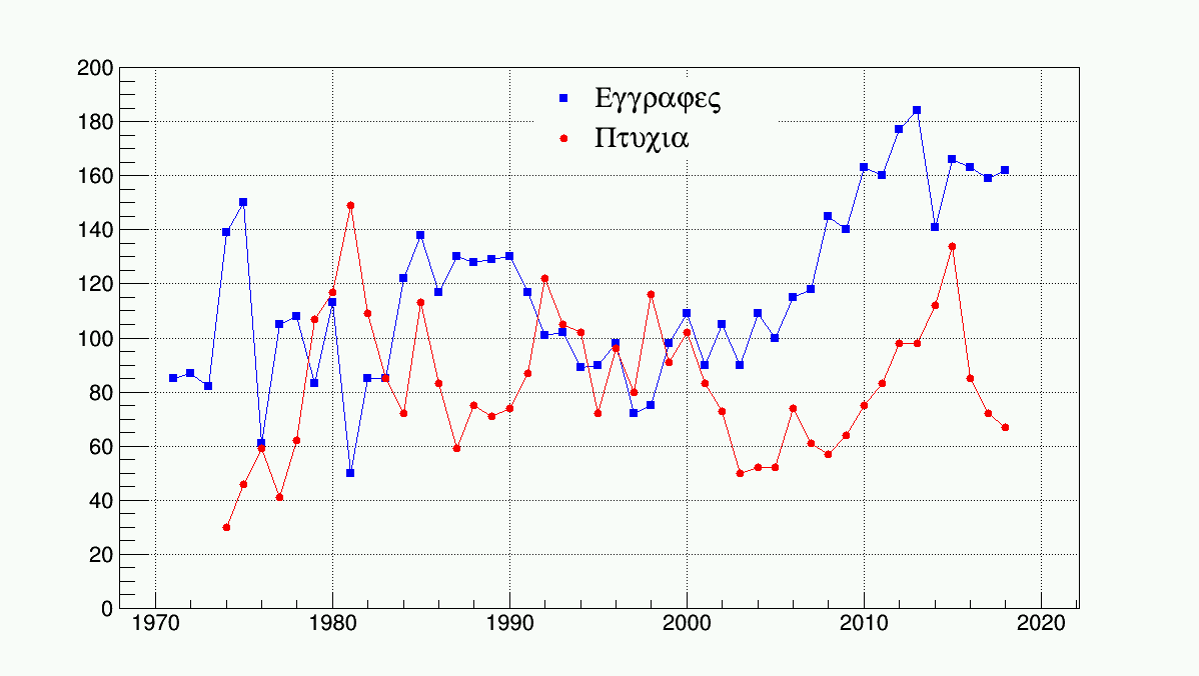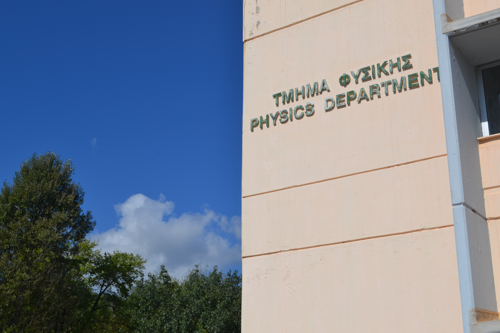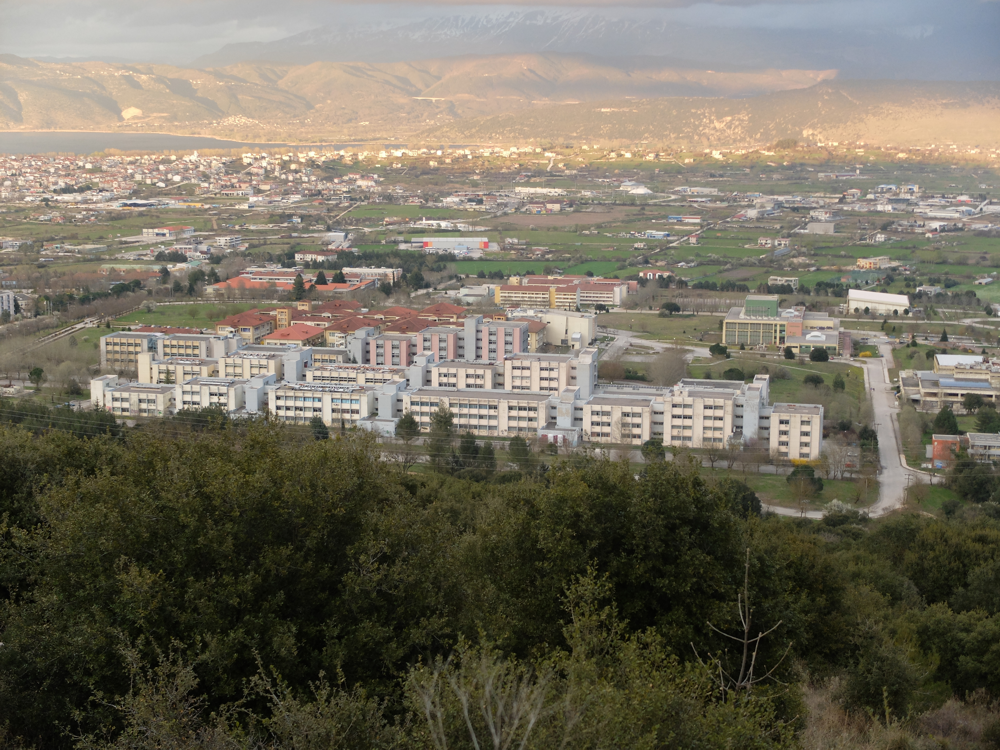Studies Regulations

Physics Department
GeneralThe study program of the Department of Physics has a duration of four years (8 semesters) and leads to the acquisition of a Bachelor’s degree in Physics. The Undergraduate Program of Studies of the Department includes 26 core courses, covering the basic knowledge of the field, as well as approximately 48 elective courses covering a wide range of specialized subjects. To obtain the degree, the student must successfully attend 26 of the core courses and a number of elective courses (approximately 13) in order to complete the required number of credit units (240 ECTS). The elective courses include the Diploma Thesis and the Practical Training. The duration of all courses is on a semester basis, except for the Diploma Thesis (annual) and the Practical Training (3-6 months).
Enrollment The academic year begins on September 1st and ends on August 31st of the following year. The educational work of each academic year is structured chronologically into two semesters (winter, spring). Each semester includes at least 13 full weeks for teaching and 2-3 weeks for examinations. Every student is required to participate in the educational process during their studies, as defined by the law and the decisions of the University and the Department’s authorities.
Students who are proven to work at least 20 hours per week may register as “part-time students” upon their request, which must be approved by the School’s Board.

Registered Students/Graduates per Academic Year Year
Enrollments – Course Declarations Student status is acquired upon enrollment in the Department and, except for special cases of suspension/termination of enrollment or disciplinary penalty, lasts until the acquisition of the degree. The first enrollment takes place within a specified period (usually 15 days) after the publication of the results of the General Examinations. Enrollment is renewed annually by declaring the courses. Course declaration is mandatory and is done electronically within a specified period at the beginning of each semester. The maximum number of courses a student can declare and take exams for in each semester is eight (8). This includes primarily the mandatory courses of the respective semester (winter or spring) that the student is required to take from previous years. If a student fails an elective course, they can either retake it or replace it with another elective course offered in the following semester.
Students who have not declared any courses cannot receive textbooks, are not admitted to exams, and if for any reason they participate in them, their performance is not graded, and if graded nonetheless, the grade they receive is not taken into account and is not recorded in any examination period.
Suspension of Enrollment Students who have not exceeded the maximum duration of enrollment may, upon their request to the Department’s Secretariat, interrupt their enrollment for a period not exceeding two (2) years. The right to interrupt enrollment may be exercised once or in parts for a minimum period of one (1) academic semester, but the duration of the interruption may not exceed cumulatively two (2) years if granted in parts. The student status is suspended during the interruption of enrollment, and participation in any educational process is not allowed.

Physics Department
Examinations take place at the end of each semester and include students who have declared and attended the respective courses that were taught. In September, before the start of the winter semester courses, re-sit examinations are held for both semesters (winter and spring). The student’s grade in each course is determined by the instructor, who may, at his discretion, organize written or oral examinations and/or rely on the student’s performance in theoretical or laboratory exercises during the semester.
The examination schedule for each semester is determined by department decisions, and the start date is announced at least one month before the start of the examination period.
For courses that are divided into two sections (even-odd), and when common examinations are not provided, the student is examined exclusively in the section corresponding to their registration number. In these courses, instructors alternately rotate annually between the two sections.
If a student fails a course more than three (3) times, they may request, through an application to the Department Chair, to be evaluated by a three-member committee, consisting of teaching staff from the same or another department of the university, with knowledge in the same or related subject as the course being examined, in which the instructor of the course cannot participate.
Since the academic year 2016-17, optional interim informal examinations have been included in each semester’s program during periods when no courses are held. For the examination periods of the current academic year, consult the Academic Calendar.
During examinations, copying, conversation, or any form of collaboration among students is prohibited, as is the possession of any unauthorized materials (such as notes, textbooks, exercise solutions). Any form of cheating during the examination process, including the transmission and reception of questions and solutions, and communication of the examinee with individuals other than examiners and proctors by any means, is strictly prohibited. The use of mobile phones or portable electronic devices (such as iPads, tablets, laptops) for any purpose (including use as a calculator or watch) is also prohibited. Any mobile phones must be fully deactivated throughout the duration of the examinations and the student’s presence in the examination room, and when leaving the room unexpectedly. Technical means may be used to monitor compliance by examinees. In each room, a list is kept by the proctors of the students who have left the room (without having definitively submitted their written work), including their full name, registration number, and the time of exit and return to the room. The list is delivered to the examiner at the end of the examinations. The instructor of each course has the right to summon the examinee for an oral examination if there are suspicions of cheating or misconduct during the examinations. Students who do not adhere to the examination regulations may face penalties, including suspension of student status for one or more semesters.
A prerequisite for participating in the examinations of a course and recording the grade is the declaration of the course. Declaration is made electronically through the classweb system during a specific period at the beginning of the semester, which is announced on the department’s website. Grades for examinations of a course that has not been declared according to the above procedure will not be recognized or recorded in any examination period.

Physics Department Courtyard
Maximum Number of Courses – Degree Grade To obtain a degree, a student must attend the Department for at least eight (8) semesters during which they must successfully complete a series of courses from which they must accumulate at least 240 ECTS credits. For students who have successfully completed more courses, elective courses with the highest contribution (grade-to-credit ratio) are taken into account for the degree grade. Up to two additional elective courses, upon the student’s request, may be included in the detailed grade report and Diploma Supplement.
The degree grade is calculated as a fraction, with the sum of the grades received by each student in each course multiplied by the corresponding credit units as the numerator and the total credit units required for the degree as the denominator. For students who have successfully completed courses corresponding to more than 240 credits, elective courses with the highest contribution (grade-to-credit ratio) are included in the degree grade, up to 240 credits or the nearest integer that replaces the denominator of the aforementioned fraction. In cases where a student has participated in practical training, the ECTS credits corresponding to it are deducted from the denominator of the fraction, as there is no corresponding grade. The degree grade is calculated to two decimal places.
Foreign Language Students choose one of the foreign languages offered by the Department (English/French/German). Students who have knowledge at the level of G2/C2 of the ASEP exam (e.g., Proficiency in English) can, if they wish, be exempted from the examination in the course with a grade of seven (7). Students must have included this specific course in their course declaration and then submit a relevant application to the Secretariat, attaching a certified copy of the corresponding diploma. Students who wish to improve the above grade can take the exam in the course during the examination periods of the academic year in which the course has been included in their declaration.

View of the Physics Department Buildings Complex
Dissertation Students who are at least in the 7th semester of their studies and have successfully completed, by the last examination before the declaration of the examination, courses corresponding to at least 120 ECTS units, can choose the course “Thesis,” which is annual and corresponds to 10 ECTS units.
Internship From the 6th semester, students can work for a certain period in Greek or international public and private sector organizations and companies (e.g., PPC, OTE, businesses), aiming at practical training and specialization in subjects related to the field of Physics. For this purpose, the student selects a faculty member as a supervisor and submits, to the department’s secretariat, together with the supervisor, a detailed description of the training and employment program, which includes the employer and the period of time. Upon completion of the internship, the student submits a report of activities in collaboration with the supervisor, accompanied by a relevant certificate from the employer. The report is evaluated by the Department’s Study Program Committee. In case of a positive evaluation, the student is awarded 3 ECTS units for the internship. These units are counted towards the 240 required for the degree but without a corresponding grade.
Transitional Provisions
- The maximum number of courses declared (eight) applies to all students regardless of the academic year of admission to the Department of Physics.
- The calculation of the degree grade with the ECTS credit system applies to students who enrolled from the academic year 2010-11 onwards. For students of previous academic years, the calculation method specified in the respective Study Guide applies.
- The current distribution of ECTS per course, as well as the requirement for 20 ECTS units from the elective courses of the General Directions of Table B, applies to students who enrolled from the academic year 2010-11 onwards.
